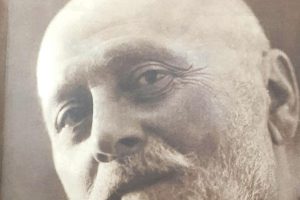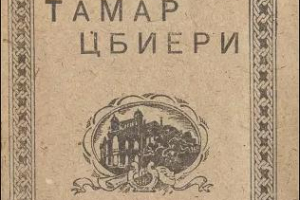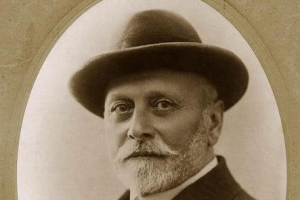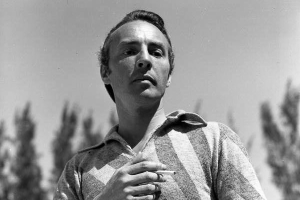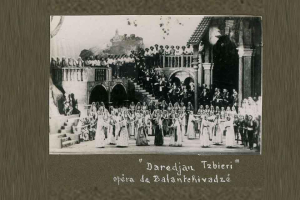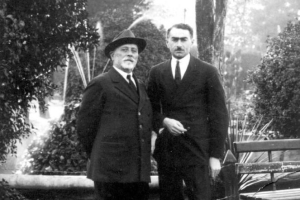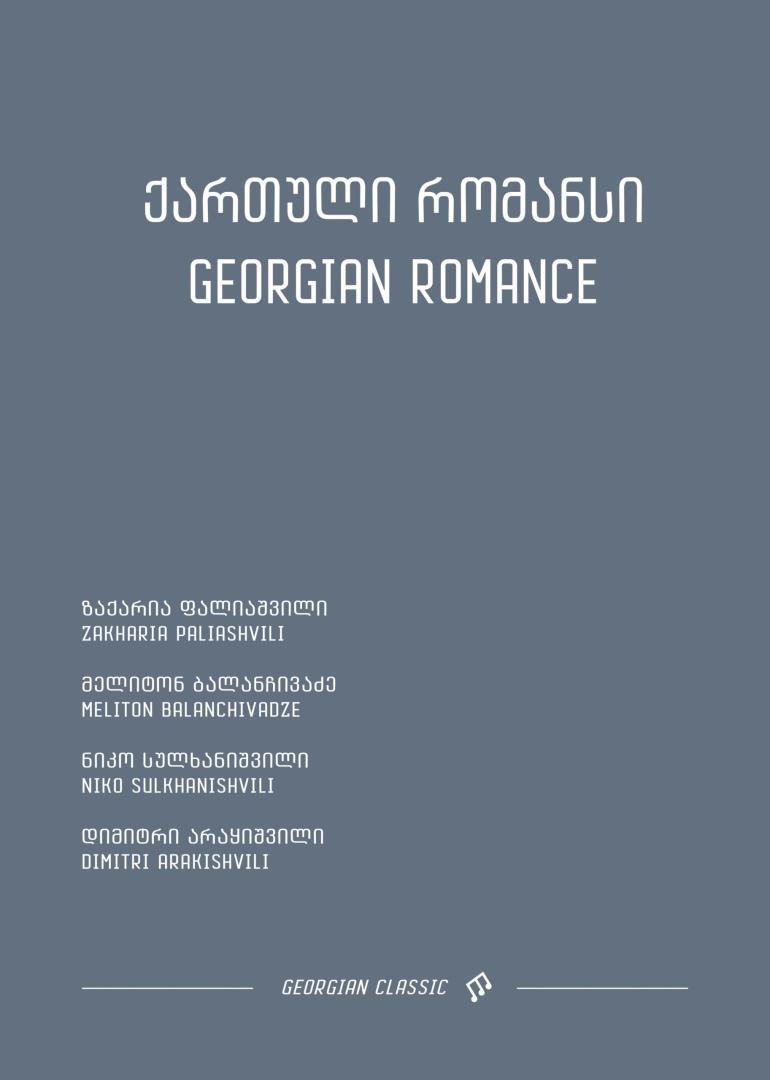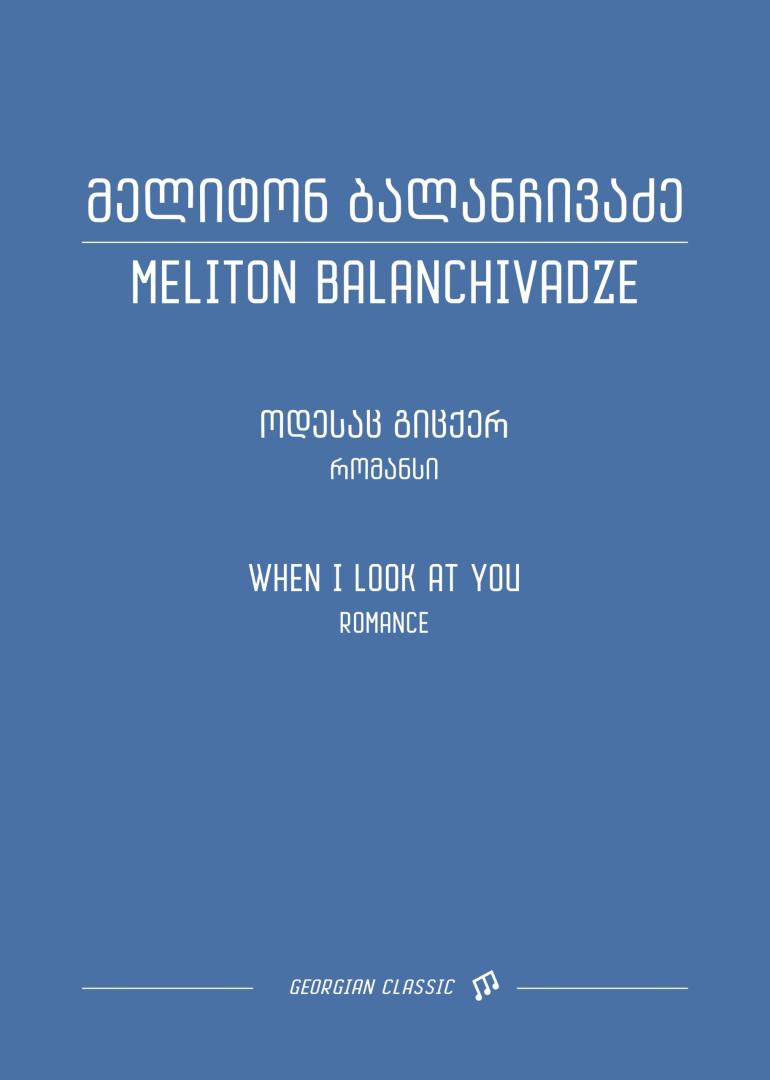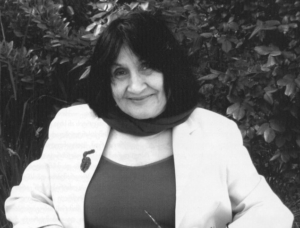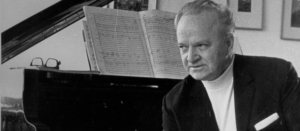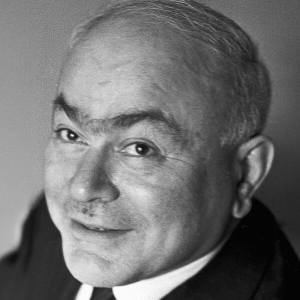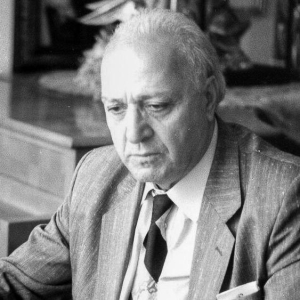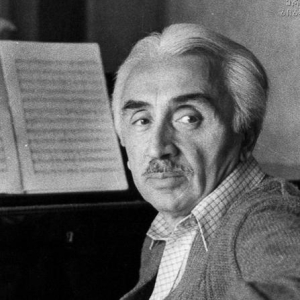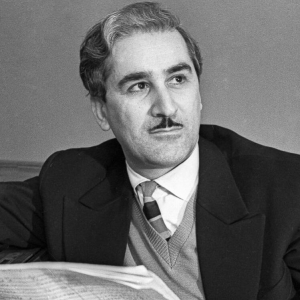Meliton
Balanchivadze
Meliton Balanchivadze
(1863 – 1937)
Meliton Balanchivadze, prominent Georgian composer, teacher, public figure, founder of Georgian opera music. People’s Artist of Georgia (1933).
Date of birth – January 5, 1863
Place of birth – Tskaltubo district, Banoja village
Date of death – December 21, 1937
He is buried in the Pantheon of Public Figures in Kutaisi
BIOGRAPHICAL DATA
He received his first–primary education at Kutaisi Theological School. During his studies, he participated in the students’ team led by Vladimir Agniashvili. Soon he formed a choir of students and taught singing.
1879 – Singer of the choir of the Exarch of Georgia;
1880 – At the invitation of Filimon Khoridze, he is a soloist of the choir of the Tbilisi Opera Theater. P. participated. Tchaikovsky’s opera “Eugene Onegin” (Zaretsky) and Sh. Gounod’s “Faust” (Valentine) productions;
1882 – Balanchivadze founds a Georgian folk song choir, which held a concert in Tbilisi in 1883. For the first time, a Georgian folk song was performed in public, which had a great cultural and national significance.
1883 – 1886 – Meliton Balanchivadze, together with Filimon Koridze, begins to record and study folk songs and hymns from all parts of Georgia;
1889 – Creates the first classical samples of the romance genre in Georgian music – “Nana”, “Shen Getrfi Marad” and “Odesats Gitsker”;
1889 – 1895 – Balanchivadze continues his studies at the St. Petersburg Conservatory: first in the vocal department (with Prof. V. Samus), and then, with the advice of Anton Rubinstein, the prominent Russian composer, St. Petersburg Conservatory professor N. in Rimsky–Korsakov’s composition class;
1889 – 1917 – Works in the Russian Empire and promotes Georgian musical art, organizes Georgian music evenings…
1997 – The premiere performance of the episodes (the first act and separate numbers of the third act) of the opera “Tamar Tsbieri” (based on “Tamar Tsbieri” by A. Tsereteli, libretto Vasiliy Velichkos), with the participation of Russian actors, in the hall of the St. Petersburg nobles’ council. The first Georgian opera staged outside of Georgia, in Russia, was well received (it was repeated in 1912 there).
1906 – In St. Petersburg, Balanchivadze took part in A. Rubinstein’s opera “Demon” in Georgian.
1907 – Financed the publication of Mikhail Glinka’s letters (St. Petersburg, 1908, 250 letters).
1918 – Founded a music school in Kutaisi, which today bears his name. actively participated in the reorganization of the Tbilisi Conservatory;
1929–1931 – Director of the Batumi Muisc School;
1935 – Director of Kutaisi Music School;
1926 – Premiere of the opera “Tamar Tsbieri” in the Tbilisi Opera Theater;
1937 – The opera “Tamar Tsbieri” changes its name to “Darejan Tsbieri” and was performed in Moscow during the Decade of Georgian Art and received high praise. Balanchivadze’s other works include the cantata “Glory to Zahes” (1927), “Students’ Song” for male and female choir and “Georgian National March” for symphony orchestra.
FAMILY
Father – Anton Balanchivadze
Mother – Ivlita Asatiani
Spouse – Maria von Allmendingen (Vasilyeva)
Children:
– Apollon Balanchivadze
– Tamar Balanchivadze – (1902 – 1943) – theater artist – died in 1943, during the Second World War, during the Leningrad blockade;
– George Balanchine (Giorgi Balanchivadze) – (1904 – 1983) – ballet master, choreographer, founder of American ballet school and neoclassical ballet – author of about 300 ballet productions;
– Andria Balanchivadze (1906 – 1992) – composer, founder of the Georgian School of Composition, People’s Artist of Georgia and the Soviet Union (1957, 1968);
Grandchildren:
– Amiran Balanchivadze – (1939)
– Tsiskara Balanchivadze – (1939) – Tbilisi Z. Ballet actor of the Opera and Ballet Theater named after Paliashvili
– Jarji Balanchivadze – (1941 – 2011) – pianist, composer, conductor;
AWARDS AND RECOGNITION
1933 – People’s Artist of Georgia
Honorary Chairman of “Young Georgian Musicians Society”;
Chairman of the board of the “Georgian Music Society”;
He participated in the establishment of folk song choirs;
Led the commission for collecting and studying folk music;
Headed the music department of public education;
Meliton Balanchivadze
(1863 – 1937)
SELECTED WORKS
MUSIC FOR THE THEATER
1897 – “Darejan Tsbieri”(sly) – Opera in 3 acts, (libretto by M. Balanchivadze)
Premiere:
- 12.1897 – I act – St. Petersburg – Hall of the Nobles – (libretto by V. Velinko)
- 04.1926 – Opera and Ballet Theatre of Tbilisi – (libretto by K. Potskhverashvili)
- 1936 – Was performed on the Georgian culture decade in “Bolshoi Theatre”
ORCHESTRAL MUSIC
1928 – “Georgian National March” – Piece for Symphonic Orchestra
VOCAL INSTRUMENTAL MUSIC
1885 – “Georgian Medly” – for Choir and Symphonic Orchestra – (text by R. Eristavi)
1927 – “Homeland of Khevsurian” – Chorale for soloist, mixed Choir and Symphonic Orchestra – (text by R. Eristavi)
1927 – “Glory to Zahesi” – Cantata for Mixed Choir and Piano – (text by N. Nanava)
First example of Cantata in Georgian music
VOCAL MUSIC
Author of many romances… Including:
1889 – “When I Look at You” – (text by G. Abashidze)
The first and popular example of the romantic genre in Georgian music
1889 – “Love You Forever” – (text by G. Volski)
1889 – “Nana” – (text by A. Tsereteli)
1889 – “Evil Soul” – (text. N. Baratashvili)
1889 – “Don’t be Pity About Me” – (text by M. Gurieli)
1889 – “Spring” – for Tenor and Soprano
Meliton Balanchivadze
(1863 – 1937)
Meliton Balanchivadze (1862-1937) is regarded as one of the pioneers of Georgian compositional art. He provided his foundation for numerous styles of Georgian professional music with Dimitri Arakishvili, Zakaria Paliashvili, Niko Sulkhanishvili and Viktor Dolidze.
Meliton Balanchivadze’s name is related to the first initiatives to record Georgian chants and folk tunes. As a composer, he wrote the first Georgian orchestral work, “Popuri,” as well as one of the earliest Georgian operas, “Tamar Tsbieri,” also known as “Darejan Tsbieri”.
Meliton Balanchivadze wrote the first Georgian romance. With his romances, a new stage in Georgian compositional art has begun. According to musicologist Vladimir Donadze, “The historical significance of these romances is that they laid the foundation not only for the creative path of the composer, but also for the entire Georgian professional music.” The romance genre paved the way for the first Georgian operas, including works by Dimitri Arakishvili, Zakaria Paliashvili, and Viktor Dolidze. Meliton Balanchivadze and his works are linked to the start of this new pattern.
Meliton Balanchivadze first demonstrated his romances to the public on a significant day in the cultural life of that moment. On March 25, 1889, the legendary Georgian writer Ilia Chavchavadze, known as the “Father of the Nation,” gave a fragment of his work to the audience at a Tbilisi “Literacy Society” event.
Ivane Machabel and Grigol Volski, both writers and prominent figures, read the new works. Meliton Balanchivadze highlighted their page with his first original creations, three romances titled “Odesat Gitsker”, “Shen Getrfi Marad” and “Nana Shvilo”.
The public appreciated Meliton Balanchivadze’s works immediately. The reason for this was the basic idea of these romances, which were related to the existence of that time, and on the other side, identifying the composer’s sound and delivering it to the audience.
Balanchivadze’s romances originated from urban folklore and are a continuation of the patch of “Tbilisi folklore” based on the fusion of European music and Georgian folk polyphony. The roots of this fusion can be traced back to Georgian aristocratic salons. Music was performed at the salon gatherings of Georgian aristocrats beginning in the early nineteenth century, with the sound of European instruments. The genre of Russian romance became very popular. Tbilisi’s opera theater was built in the 1950s, and Italian opera songs have become a part of the city’s image. Along with opera arias, Neapolitan melodies were performed on the streets. The European branch of Tbilisi folklore arose from a combination of these elements and the Georgian popular culture. It was an entirely new style of voicing based on the major-minor system, with two-part songs accompanied by guitar. The popularity of such songs developed beyond Tbilisi, spreading and developing in the cities of Imereti in Georgia’s western corner, Kutaisi and Zestaphoni… In these cities, “urban” music developed new characteristics, and the concept of “urban folklore” became more broad. It was a finding not only of “Tbilisi culture,” but of Georgian musical art in general. Despite growing up in an environment where Georgian folk songs and spirituals were prioritized, Meliton Balanchivadze during his studies in Kutaisi and then in Tbilisi, frequently heard urban songs and romances played on the guitar. The composer’s work gave new life to tunes from urban folklore.
Individual nuances were evident in Balanchivadze’s earliest romances: immediately rendition of the melody, grace combined by tenderness, and directness. The composer’s main themes are passionate and patriotic. These beginnings were further developed on in his opera “Tamar Tsbieri” (also known as “Darejan Tsbieri”). Balanchivadze brought in a new stream of Georgian lyrical romance. The sarcastic theme takes on a powerful, vivid color in his compositions. The wide-spread melody, characteristic rhythmic line, and metrical variations create excitement and joy in one of the composer’s earliest books, “Odesat Gitsker,” written on the text of the 19th century Georgian poet Grigol Abashidze, and the flowing, waltz-like rhythm adds the charm. A harmonic background, as well as the enhancing effect of the major key, will increase the positive view of the universe.
In the romance “Shen Getrfi Marad” (based on Grigol Volsky’s poem), the composer strengthens the sorrowful line, which distinguishes from the previous piece in its mournful feeling. The recitative melody creates this type of mood in the second part. Sadness is stren the patriotic poetry of Ilia Chavchavadze is the creative source of the romance “Nana Shvilo.” Balanchivadze emphasized a more lyrical beginning in this composition as well. The composer added smoothness and softness to the urban ballad “Ortav tvalis sinatlev” as the piece’s musical basis gthened by a basic melodic flow in the form of a theme.
The motif of philosophical lyrics, may also be found in Balanchivadze’s romances similar to the work of the famous Georgian romantic poet Nikoloz Baratashvili’s poem “Evel soul”. The romance written on Akaki Tsereteli’s poem “Uphill I was walking slowly” is an example of patriotic music.
The first two novels by Balanchivadze were published in St. Petersburg. The Bessel firm produced “Odesats Gitsker” in 1891, and P. Volkov’s musical typography published “Shen Getrfi Marad” in 1916. Even now, Balanchivadze’s romances are performed with enthusiasm and passion, thus the vitality of the first Georgian romances continues.
Musicologist
Tamar Tsulukidze
English Language Translator
Tamar Kharadze



